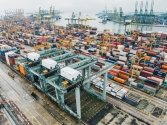
Haze from Indonesian fires threaten to swallow Southeast Asia
Over 22,000 individuals have been affected.
According World Resources Institute, the governor of Indonesia’s Riau province issued a state of emergency last week as thick haze blanketed large areas of the region, closing down schools and airports.
According to local officials, more than 22,000 people have been impacted by respiratory problems–with the potential for many more if winds shift the haze to other more densely populated areas such as Kuala Lumpur or Singapore.
Here's more from WRI:
Clearing land for timber and agriculture is likely to blame. According to data from Global Forest Watch—a new online system that tracks tree cover change, fires, and other information in near-real time—roughly half of these fires are burning on land managed by oil palm, timber, and logging companies—despite the fact that using fire to clear land is illegal in Indonesia.
This latest haze emergency is reminiscent of a similar one that flared up in Indonesia in June 2013 (see WRI’s coverage of the fires crisis). So what’s different this time around, and what’s the same? We’ll attempt to answer these questions using satellite technology and Indonesian government data found in Global Forest Watch.
Our new analysis detected 1,449 “high confidence” fire alerts on the island of Sumatra from February 20-March 3, 2014. Like last June, the fire alerts—which are detected using NASA’s Active Fire Data—are concentrated in the island’s Riau province.
And like the June 2013 crisis, almost half of the fire alerts fall within timber, palm oil, and logging concessions.
Very distinct clusters of fires can also be seen within specific company concessions. Using Global Forest Watch, everyone can explore these patterns, see the precise locations of the fires day-by-day, and determine which companies are operating in these areas.
A list of the affected concessions and companies is available at the end of the document. Closer investigation on the ground by Indonesian authorities is needed to pinpoint the exact causes of the fires at these locations and determine whether companies have perhaps broken the strict laws that limit the use of burning.
There’s more that Indonesia and other countries should do to address the forest fires problem. While Global Forest Watch relies on the best data available, the Indonesian government has not yet released its most up-to-date concession information. The concession data shown above from the Indonesian Ministry of Forestry gives us a good idea of which companies are operating where, but it has several known inaccuracies. More transparency on the exact locations of concessions would make it easier to monitor and hold companies accountable when fires flare.
This transparency may improve in the near future. In October 2013, ministers from five Southeast Asian nations—including Indonesia—met to discuss haze prevention and agreed to share concession data on a country-to-country basis (though not make it public). Furthermore, the Roundtable on Sustainable Palm Oil (RSPO), an industry group, has adopted a resolution that commits their member companies to share concession data openly.
In the meantime, companies, NGOs, governments, and concerned citizens can go directly to Global Forest Watch to monitor fire alert data and overlay it with data on concessions, protected areas, and land cover. With this information easily accessible, companies, local law enforcement, and governments cannot use ignorance as an excuse for inaction.























 Advertise
Advertise








